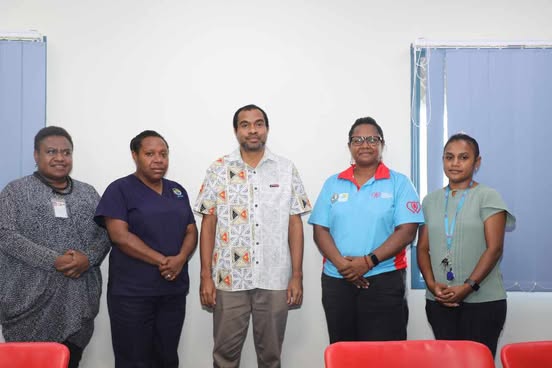The Blood Bank Donor Centre at Port Moresby General Hospital (PMGH) is now appealing to the public to volunteer for blood donations at the hospital.
The vision of this volunteer donor initiative is to create a sustainable blood supply because of the high demand of blood in the hospital and less supply.
An awareness will be done to educate the public on what to do and what not to do prior to visiting the blood bank to donate blood. The awareness done will also educate the younger population and create a culture of volunteer blood donation.
Chairman of PMGH Blood Transfusion Committee, Dr. Carl Kingston said that the PMGH Blood Donor carried out 52 awareness campaigns last year 2024 in which 3, 620 people were educated through the awareness drives.
They have worked with 32 different organizations including Brian Bell Group and ExxonMobil in which the staff were needed to spend a few days on site at the location where they collected their blood.
According to Dr. Kingston, the festive season and going into the new year has always been a challenge for services at the hospital in terms of the influx of people needing blood on top of the usual cases in the hospital.
“Apart from cancer and mothers in labor, children needing blood, kidney failure, complications of diabetes and hypertension (High blood pressure) and all of those require blood.”
“The blood transfusion center serves not only PMGH but also NCD and all the clinics, health centers and private facilities in NCD, Central Province and Gulf Province.”
Meanwhile, he also stated the reasons why some of the volunteer donors were not able to give their blood when they went through after the pre-screening process due to low hemoglobin, lack of sleep and alcohol consumption.
“We have about 9, 656 people who couldn’t donate at the first attempt when they came because they were deemed not ready to donate. The highest reason was low hemoglobin which in terms means short blood supply. Our community generally has low blood hemoglobin.”
“In terms of lack of sleep, people are generally not prepared well and so we recommend eight hours of sleep before they come so they are better prepared to donate.”
Donor Centre Assistant Nurse Unit Manager (NUM), Sister Julieth Ohuesahu, stated that the donor recruitment criteria are adapted from the World Health Organization (WHO) Donor selection criteria as well as questionnaires that are given out to donors followed by a mini health screening.
“The mini health screening will be done to decide from the questions answered whether the blood donation will be taking place from that donor or not based on their answers on the rejection criteria.
“As for last year, we have seen a total of 22, 000 donors from which we have collected 12, 000 blood bags from.”
Moreover, both medical equipment and manpower is needed more at the Blood Bank Donor Centre with appeals being made to private sectors to assist the center with.
“We would like to appeal to the private sector to assist us with a bus that will enable us to bring our staff and equipment as well as other consumables to the sites that we go to collect blood from during our mobile drive.”
“We also need more staff in helping to conduct educational awarenesses whilst others focus on collecting blood and screening blood.”
“Support from the private sector would be welcomed and most needed,” said Dr Kingston.

